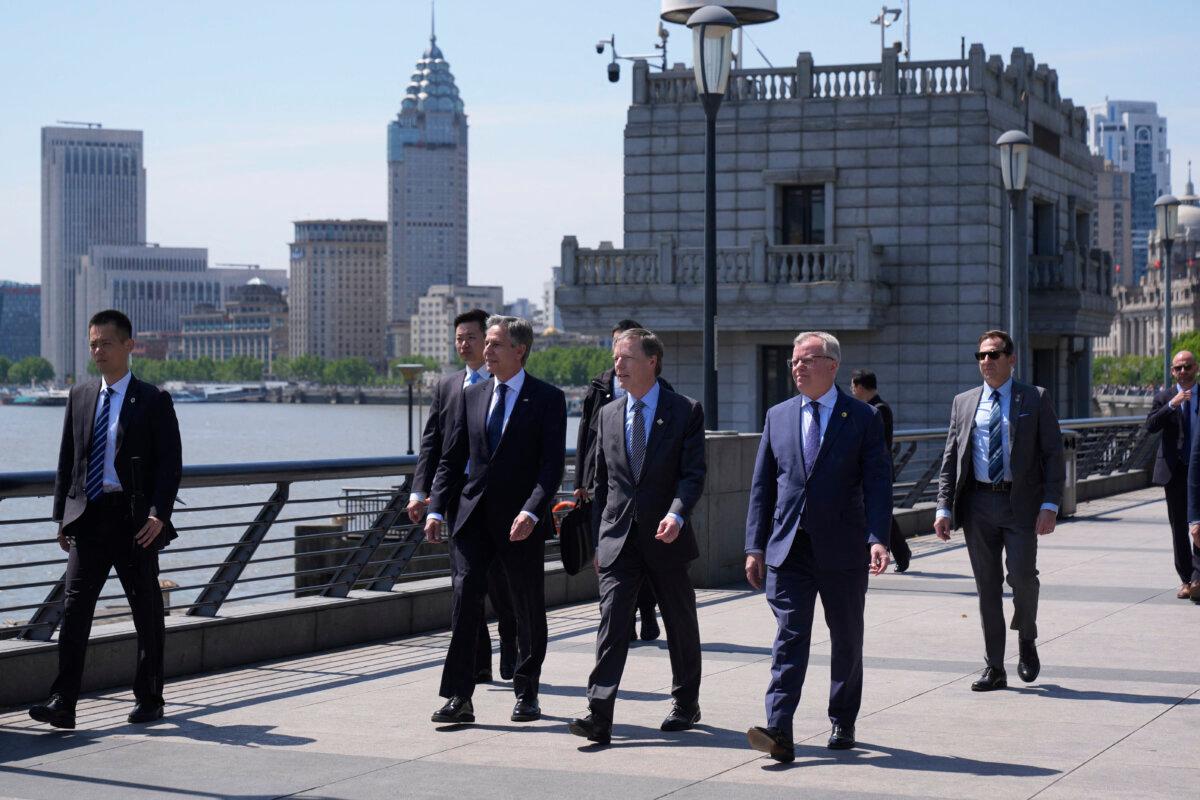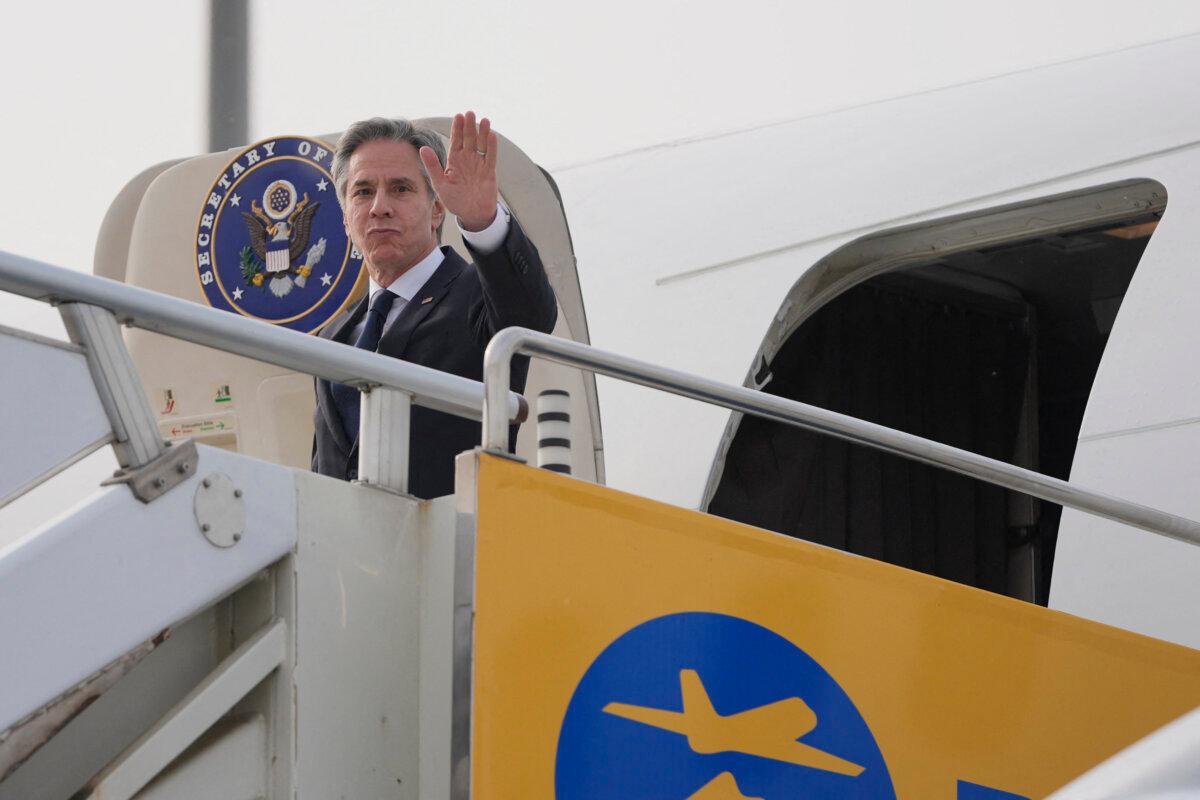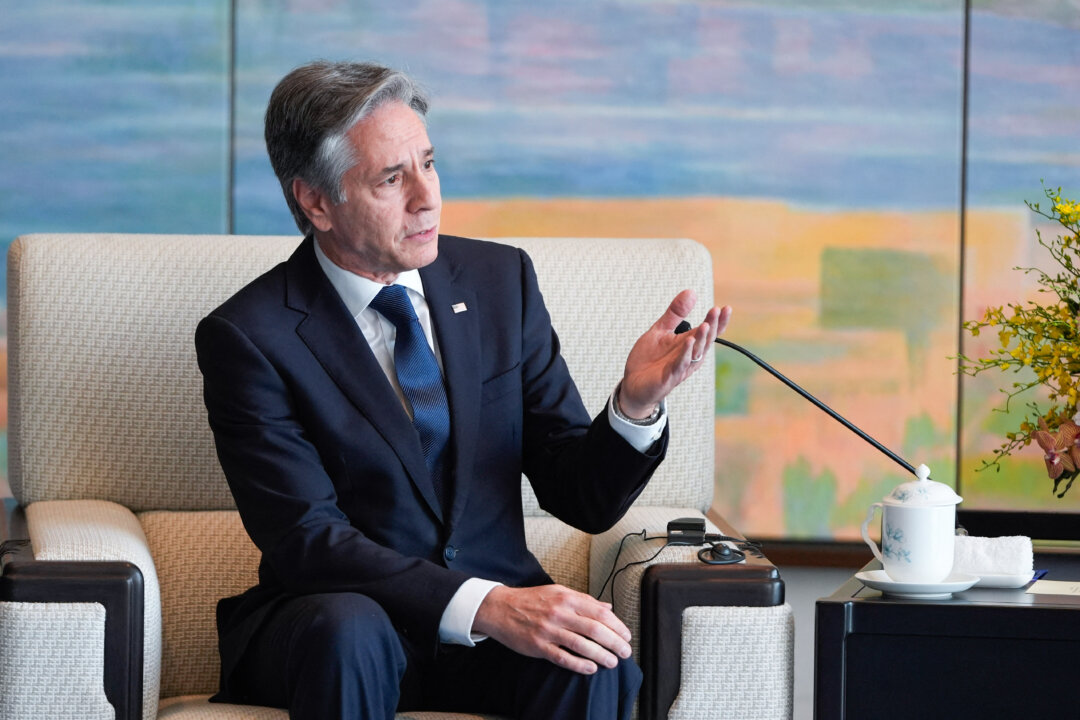Blinken is on his second trip to China as secretary of state to tackle a series of contentious issues, including trade, human rights, and Russia’s Ukraine war.
U.S. Secretary of State Antony Blinken brought up China’s non-market trade practices and called on the communist regime to provide U.S. businesses with a level playing field, in the first stop of his China visit.
China and the United States have “an obligation for our people and, indeed, an obligation for the world to manage the relationship between our two countries responsibly,” he said ahead of a meeting with Chen Jining, Shanghai’s Communist Party chief, on April 25.
State Department spokesperson Matthew Miller said in a statement that Mr. Blinken raised concerns about Beijing’s “trade policies and non-market economic practices.”
The secretary of state also used the meeting to stress that the United States seeks “healthy economic competition” with communist China and “a level playing field for U.S. workers and firms operating in China,” according to the statement.
U.S. officials have renewed concerns about China’s trade policies and practices—such as massive state subsidies, the surplus of clean energy exports, and intellectual property theft—that have put U.S. companies and workers at an unfair competitive disadvantage.
The Office of the U.S. Trade Representative is probing Beijing’s unfair trade practices in maritime, logistics, and shipbuilding industries. President Joe Biden has called to triple tariffs on steel and aluminum from China.
Amid a property crisis and weak consumption, China is seeking to boost its underperforming economy by pouring money into the manufacturing sector. By shifting policy focus toward what it calls the “new three” growth areas of electric vehicles, lithium-ion batteries, and photovoltaics, it has flooded the global market with low-priced Chinese products in these sectors.
Earlier this month, Treasury Secretary Janet Yellen confronted senior Chinese officials about the country’s overproduction, saying it is “too large for the rest of the world to absorb this enormous capacity.”
“When the global market is flooded by artificially cheap Chinese products, the viability of American and other foreign firms is put into question,” Ms. Yellen said as she wrapped up her trip to China.
Despite the growing backlash over its trade practices, the Chinese regime appeared undeterred. At a regular briefing later on April 25, Chinese Foreign Ministry spokesperson Wang Wenbin contended that the regime conducted economic and trade cooperation “in accordance with market principles.”
He called on Washington to work with the regime to “create favorable conditions for the sound and stable development of China–U.S. economic and trade relations.”
Following the meeting with Mr. Chen, Mr. Blinken held talks with business leaders at the American Chamber of Commerce’s Shanghai branch.
Before heading to Beijing later on April 25, Mr. Blinken also spoke with students at New York University’s campus in Shanghai, where he highlighted the importance of intercultural exchange between the two countries.

Mr. Blinken’s second trip to China as secretary of state took place as the United States and communist China remained at odds on a series of issues ranging from the crisis in Ukraine and the Middle East to the status of Taiwan.
Just hours before Mr. Blinken’s arrival, the U.S. Congress gave final approval to a defense package that includes roughly $8 billion for Taiwan and other partners in the Indo-Pacific region to confront Chinese aggression. The legislation could also bar TikTok from operating in the United States unless its China-based parent company, ByteDance, sells the app within a year. Later on April 24, President Biden signed it into law.
China has voiced objections to U.S. aid to Taiwan, a self-ruled island that the Chinese Communist Party (CCP) views as a breakaway province, warning that it “will not bring security” to Taipei.
Mr. Blinken is set to meet Wang Yi, the CCP’s top diplomat, on April 26. China hasn’t confirmed whether Mr. Blinken will sit down with CCP leader Xi Jinping. Xi received the visiting secretary of state in Beijing in July 2023, but their talk wasn’t publicly confirmed until shortly before it took place.

The top U.S. diplomat is likely to have tough talks in Beijing, where he will press the CCP leaders to curtail its support for Russia’s defense industrial base amid the Ukraine war.
Following meetings with G7 foreign ministers in Italy earlier this month, Mr. Blinken called China a “primary contributor“ to Russia’s defense, saying it sent ”machine tools, semi-conductors, other dual-use items” to keep Moscow’s defense sector afloat.
The secretary of state will also raise U.S. concerns about human rights in China, according to the State Department. A day before his trip, the State Department released a report that Mr. Blinken said documented the “ongoing grave human rights abuses” in China. The groups targeted by the Chinese communist regime include persecuted minority groups, dissidents, foreign journalists, and adherents of spiritual faiths.
Robert Gilchrist, a senior official for the State Department’s Bureau of Democracy, Human Rights, and Labor Affairs, told reporters that Mr. Blinken will “raise human rights at the highest levels and in the clearest way” while in China.

